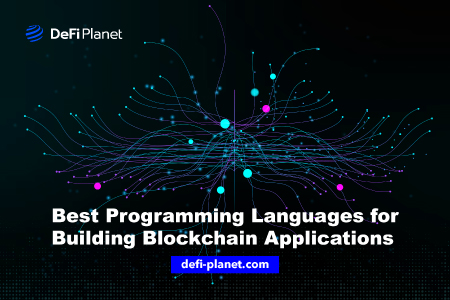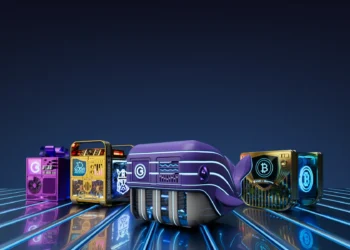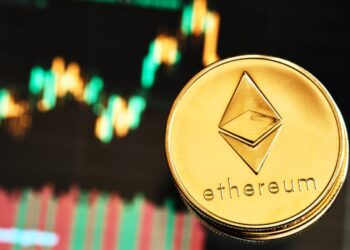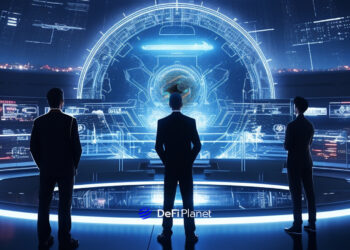The blockchain industry has already grown to the point where several competing ecosystems rule the market and tell blockchain developers how their next projects should be set up.
There is currently a large ecosystem of EVM blockchains, including Ethereum, Polygon, Binance Smart Chain, Avalanche, and lots more. Also, two major projects connect various ecosystems based on interoperability. These include Polkadot and Cosmos.
We also have other ecosystems, such as Solana, DFINITY, Telos, and EOS, not to mention the entire family of Bitcoin forks and altchains.
Blockchain is here to stay; the global expenditure on blockchain services reached $6.6 billion in 2021 and is expected to triple by 2024. That is why those who want to stay at the top of the charts and create a successful product with a large global user base must consider the technology stack first.
There are different programming languages depending on a project’s blockchain ecosystem. This article will explore some of the best programming languages for building blockchain applications. We will go over the benefits and drawbacks of these languages and some resources for learning them.
What is Blockchain Development?
Blockchain development entails the creation of various types of applications on top of the blockchain platform that users can use to store and securely transfer data without the involvement of a third party.
Blockchain technology was first discussed in 1991. However, Satoshi Nakamoto created it in 2008 when he published the Bitcoin whitepaper, A Peer-to-Peer Electronic Cash System. Since then, cryptocurrencies have grown enormously, with over 20,000 available on the market.
Top Programming Languages for Building Blockchain Applications
Solidity
Solidity is a blockchain programming language designed specifically for developing Ethereum smart contracts. It’s a domain-specific language (i.e., DSL) which means it was created specifically for a specific purpose. In this case, smart contracts are being developed.
It is used for developing smart contracts using object-oriented and high-level programming concepts. Developers believe it is the most stable and widely used blockchain programming language. Solidity was made to work with the Ethereum Virtual Machine (EVM). It was based on Python and C++.
Solidity is dedicated to creating decentralized applications on the Ethereum blockchain. The first version of Solidity was released in 2015 by Christian Reitwiessner, Gavin Wood, Yoichi Hirai, and Liana Husikyan. At the time, they were working on the Ethereum platform.
Solidity has risen to prominence as the most widely used programming language in the Ethereum ecosystem. It is also one of the first blockchain programming languages that must be learned to create decentralized applications (i.e., dApps).
Pros
- It gives access to JavaScript infrastructure.
- It has precise accuracy.
- Solidity is developer-friendly and user-friendly, making it one of the best options for developing ICOs or dApps.
Cons
- Once a contract is made in Solidity, it cannot be altered. Additional features cannot be added to the contract.
- It is possible that sufficient code coverage for smart contracts will not be achieved.
- There is a lack of centralized documentation of known vulnerabilities.
Projects Using Solidity
Resources for Learning Solidity
- Official Solidity websiteSolidity by Example
- CryptoZombies
- Speedrun Ethereum
- Smart Contract Best Practices
Python
As a beginner, Python may be the best programming language to use for building blockchain applications because it has fewer shortcodes and is easier to use.
Python is an open-source language; hence you can use a variety of resources and plug-ins. It supports OOP dynamically and is widely used in blockchain development, artificial intelligence, and machine learning.
The most popular options in blockchain programming are graphical user interfaces that aid in the creation of applications such as Tk, PyQt5, and others.
Pros
- Python executes each line individually, making it easier to detect and debug errors.
- It uses an Object-Oriented Programming language which is simple. Hence, users can spend more time understanding the code than framing syntax.
- It has an extensive library: Developers don’t need to rely on external libraries because Python has a vast library.
- It has relatively short codes: Its English-like syntax makes it simple to use and navigate.
Cons
- It is too rigid for cell phones.
- Since Python is a dynamically typed language, the data type of variables can change at any time, resulting in errors in the output.
- Python requires a large amount of memory, thereby taking longer to execute.
Projects Using Python
- Steem
- NEO
- Hyperledger Fabric
Resources for Learning Python
- Python.org
- Codecademy
- Introduction to Python Programming
- The Python Bible
- Python Data Science course by IBM
Rust
Rust is a multi-paradigm programming language designed for improved performance and safety. It provides:
- Excellent documentation.
- A comprehensive set of developer tools.
- A user-friendly compiler with helpful error messages.
Rust is the most efficient programming language for developing smart contracts because it allows for productive collaborative work for project teams as well as open-source developers who want to contribute to the protocol.
The Rust programming language enables programmers to control low-level details without any hassle or micromanagement, resulting in an excellent balance of technical capacity and coding experience.
Furthermore, Rust provides exceptional speed and stability through the use of a real-time compiler that validates code through feature additions and refactoring. As a result, this language meets all of the primary requirements for blockchain development and much more.
Pros
- It offers clear development guidelines
- It features a self-upgradability function due to the use of WASM
- It effectively manages mutable states
- It is reliable
- It has zero-cost abstractions
Cons
- Rust is a little slower than other programming languages when it comes to compiling code.
- It can be a little too strict at times.
- The learning curve is steep, and one must understand C++ or other Object-Oriented Languages.
Projects Using Rust
- Solana
- Substrate
- NEAR
- Parity.io
- Polkadot
Resources for learning Rust
- Rust Programming Course for Beginners – Tutorial
- Take your first steps with Rust
- Rust Programming Tutorial
- Rust on Exercism
- Learn Rust by Building Real Applications
JavaScript
JavaScript is the first programming language that those new to Web3 or Web 2.0 should learn. Those that are familiar with using JavaScript for building websites and apps can still use it to build blockchain applications.
For instance, a front-end engineer who creates apps in JavaScript does not need to learn a new language. The front-end engineer can easily make his or her application interact with existing smart contracts or the blockchain itself.
NEAR is a popular protocol that allows developers to write smart contracts in JavaScript or Rust. You can go far with only JavaScript and then go into other languages depending on your goals and the type of blockchain application you want to work on.
Pros
- It supports functional programming and is thus the most commonly used blockchain programming language.
- JavaScript is object-oriented
- It is prototype-based
- It is good at handling asynchronous actions and can easily handle communications between nodes.
Cons
- JavaScript is dynamic.
- The code can be viewed by anyone.
- The browser determines the interpretation.
Projects Using JavaScript
The SideChain Development Kit (SDK) for Lisk is written in JavaScript and allows developers to build applications on top of Lisk’s blockchain platform.
Resources for Learning JavaScript
C-Sharp (C#)
C# is a multi-paradigm, object-oriented programming language. Microsoft created it in 2000 as part of the .NET initiative to replace C++ as the primary language used in video games.
It is the most widely used programming language for creating enterprise-powered apps, cross-platform applications, and cloud applications. C #’s popularity has grown over the last decade as a result of its feature set for enterprise-powered apps and cloud computing.
C# was ranked fifth on the TIOBE index in July 2021. According to the Stack Overflow Developer Survey 2021, 29.81% of developers in the industry now use C#. Furthermore, SlashData estimates that there are 6.5 million C# developers.
Pros
- It has a large library class that makes it easier for developers to create distributed systems, smart contracts, dApps, and other blockchain-related applications.
- C# simplifies the process of developing blockchain applications by supporting memory loss.
Cons
- The performance of C# isn’t the best.
- It depends on the .NET platform.
- It has a difficult learning curve.
Project Using C#
- Stratis
Resources for Learning C#
- C# Basics for Beginners: Learn C# Fundamentals by Coding
- C# Intermediate: Classes, Interfaces, and OOP
- C# Advanced Topics: Prepare for Technical Interviews
- Introduction to C# Programming and Unity
- Data Structures for Coding Interviews in C#
In Conclusion
- Blockchain technology is predicted to have a significant impact on all industries and sectors. Many industries have been able to overcome longstanding challenges and take advantage of new opportunities thanks to blockchain technology.
- In this article, we have discussed some of the top programming languages that can be used to build blockchain applications. Each language has different capabilities, so it is important for blockchain developers to determine which language is best for the type of development they are doing and then focus on improving their skills in that language.
If you would like to read more articles like this, visit DeFi Planet and follow us on Twitter, LinkedIn, Facebook, and Instagram.
“Take control of your crypto portfolio with MARKETS PRO, DeFi Planet’s suite of analytics tools.”





















